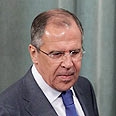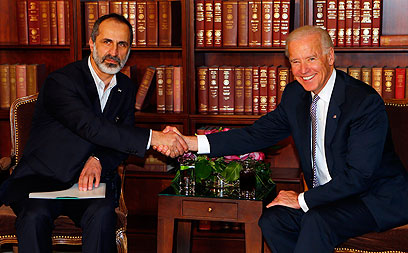
Russian Foreign Minister Sergei Lavrov
צילום: EPA
Syria opposition chief meets Russia's Lavrov in Munich
Syrian National Coalition Chief Moaz Alkhatib to hold meetings with US VP Biden, UN's Syria envoy Brahimi and Russian FM Lavrov
The leader of the Syrian opposition was expected to meet US, Russian and UN officials on Saturday at a Munich conference which may provide a rare chance to overcome differences on how to end Syria's civil war.
US Vice-President Joe Biden, head of the Syrian National Coalition Moaz Alkhatib, UN envoy Lakhdar Brahimi and Russian Foreign Minister Sergei Lavrov were all expected to meet – but not necessarily all at the same table, as the opposition hoped.
Related stories:
- Russia to evacuate citizens from Syria Report: US, Russia agree on end to Assad's rule Russia: Syria acting to secure WMDs
Biden lamented the lack of international agreement – between Washington and Moscow in particular – on how to resolve Syria's crisis. But nobody could doubt "the increasingly desperate plight of the Syrian people and the responsibility of the international community to address that plight", he said.
Government forces and rebels clashed again in several areas of Syria including around Damascus but there were no reports of casualties, according to activists and the Syrian Observatory for Human Rights.

Alkhatib (L) and Biden (Photo: Reuters)
Biden stressed the need to make the Syrian opposition "more inclusive and cohesive", as dramatized by a challenge on Friday to Alkhatib's authority after he broke ranks to say he would be willing to meet Syrian officials to discuss a transition if political prisoners arrested in the revolt were freed.
The Syrian opposition had raised hopes that there could be three-way or four-way meetings at the Munich Security Conference with the United States, Russia and United Nations on Saturday, but UN and Russian officials rushed to play this down.
"Media reports of a meeting in Munich in the format of Lavrov-Biden-Brahimi and Syrian opposition representative Alkhatib do not correspond with reality," Russian Deputy Foreign Minister Gennady Gatilov said.
But one European official, speaking on condition of anonymity, said U.N. envoy Brahimi was still trying to set up a four-way meeting on Saturday.
'Tyrant must go'
Brahimi told the conference in the southern German city he was pessimistic about the chances of a quick solution.
"I am much more conscious of the difficulties, of the country being broken down day after day, than I am of a solution," he said, speaking at a panel alongside Alkhatib.
Neither the Syrian people nor the countries of the region were able to find a way to end the conflict, Brahimi said, meaning it was up to "the wider international world" and UN Security Council members to overcome their divisions on Syria.
"You are the last appeal," he told the conference.
One high-level member of the Syrian opposition coalition told Reuters that Russia may be softening towards a meeting with Alkhatib after he said he was willing to hold talks with the government of President Bashar Assad.
A Russian diplomatic source did not rule out a meeting taking place "spontaneously" at the weekend Conference on Security and Cooperation in Europe.
If this occurred, it would be the first time the United States and Russia, at loggerheads over whether Assad can have a role in a transitional government, had sat down together with the opposition.
There was no sign at the Munich conference that their positions on the fate of Assad were getting any closer.
"The persistence of those who say that priority number one is the removal of Assad is the single biggest reason for the continuing tragedy in Syria," said Lavrov.
Biden said the White House was "convinced that President Assad, a tyrant hell-bent on clinging to power, is no longer fit to lead Syrian people and he must go."
Russia, Syria's main arms supplier, has blocked three UN Security Council resolutions on the 22-month-old Syrian conflict, which has killed more than 60,000 people.
Lavrov told the Munich conference he believed the biggest threat in Syria was "the possibility that the rebels get hold of the chemical weapons" which he said Assad's government controls.
- Receive Ynetnews updates directly to your desktop










